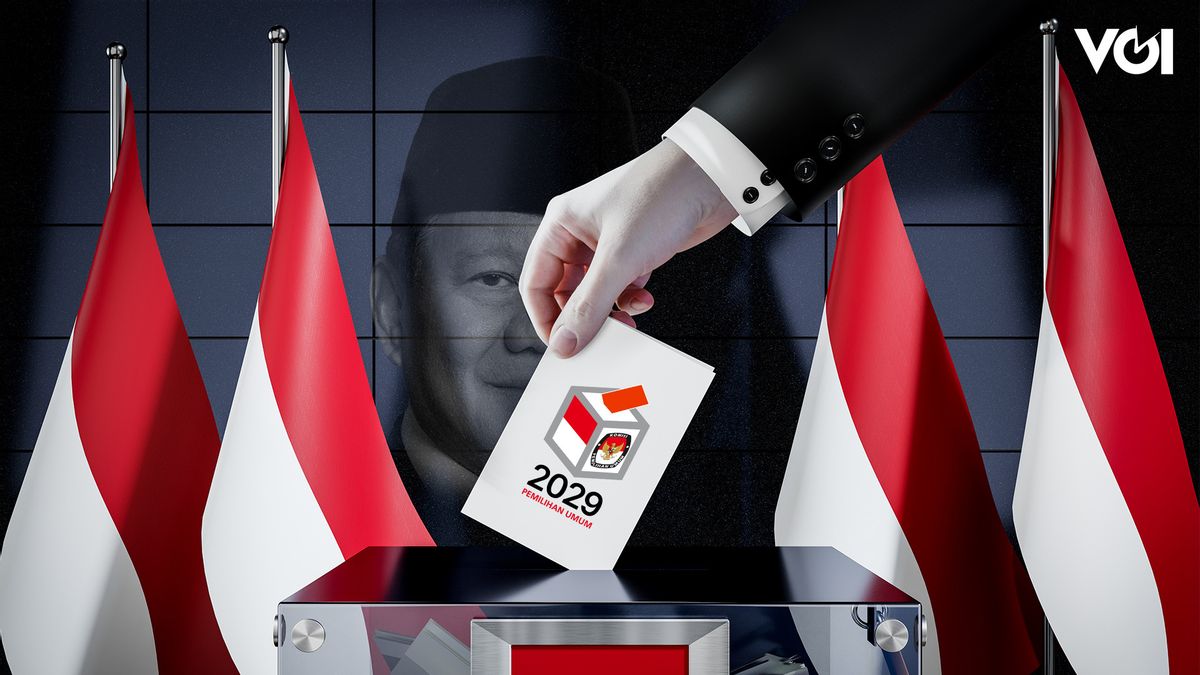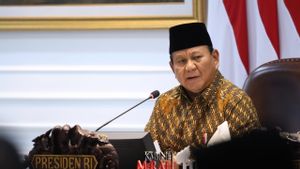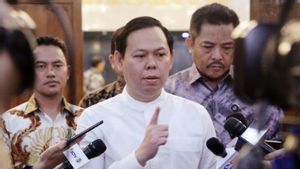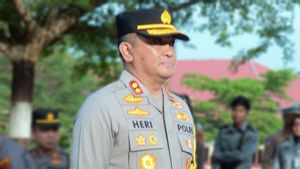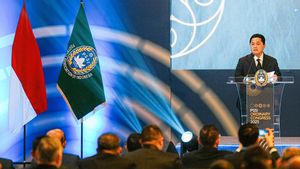JAKARTA The Constitutional Court (MK) surprisingly abolished the presidential and vice presidential nomination threshold (presidential threshold) for the 2029 Presidential Election (Pilpres). This means that all political parties, whether parliamentary or non-parlementary, have the right to nominate presidential and vice presidential candidates without thinking of forming a coalition to meet the 20 percent limit of seats in the DPR RI or 25 percent of the national legitimate votes.
The chairman of the Constitutional Court, Suhartoyo explained, the presidential threshold listed in Article 222 of Law Number 7 of 2017 concerning General Elections (UU Pemilu) is not only against the political rights and sovereignty of the people, but also violates morality, rationality, and injustice that is intolerant and in fact contrary to the 1945 Constitution. This reason is the basis for the Constitutional Court to shift from the establishment in previous decisions related to the presidential threshold material test.
The Constitutional Court considers that the shift in establishment is not only related to the amount or the percentage figure of the threshold, but what is much more basic is the threshold regime for proposing pairs of presidential and vice presidential candidates (presidential thresholds) regardless of the amount or percentage figure is contrary to Article 6A paragraph (2) of the 1945 Constitution of the Republic of Indonesia.
"Stating the norm of Article 222 of Law Number 7 of 2017 concerning General Elections (State Gazette of the Republic of Indonesia of 2017 Number 182, Additional State Gazette of the Republic of Indonesia Number 6109) contradicts the 1945 Constitution of the Republic of Indonesia and does not have binding legal force," Suhartoyo said Thursday, January 2, 2025.
SEE ALSO:
Although the presidential threshold is declared unconstitutional, the Constitutional Court asks that it must still be taken into account the potential number of pairs of presidential and vice-presidential candidates is the same as the number of political parties participating in the election. This refers to Indonesia as a country with a presidential system that in practice grows in a pluralistic party model (multi-party system).
Despite emphasizing the proposal of pairs of presidential and vice presidential candidates as constitutional rights for all political parties that have been declared as election participants, the Constitutional Court hopes that in the revision of the Election Law in the future, legislators can regulate so that there will not be too many pairs of candidates so that it has the potential to damage the essence of holding direct presidential and vice presidential elections by the people.
Therefore, in its decision, the Constitutional Court provides guidelines for legislators to carry out constitutional engineering. First, all political parties participating in the election have the right to propose pairs of presidential and vice presidential candidates. Second, proposing pairs of presidential and vice presidential candidates by political parties or coalitions of political parties participating in the election are not based on the percentage of seats in the DPR or the acquisition of valid votes nationally.
Third, in proposing pairs of presidential and vice presidential candidates, political parties participating in the election can join as long as the coalition of political parties participating in the election does not cause the dominance of political parties or coalitions of political parties, causing limited pairs of presidential and vice presidential candidates and limited voters.
Fourth, political parties participating in the election who do not propose pairs of presidential and vice-presidential candidates are subject to a ban on participating in the next period of elections. Fifth, the formulation of constitutional engineering, including changes to the Election Law, involves the participation of all parties who have concern (concern) on holding elections, including political parties that do not get seats in the DPR by applying meaningful public participation principles (meaningful participation).
Coordinating Minister for Law, Human Rights, Immigration and Corrections, Yusril Ihza Mahendra, said the government respects the Constitutional Court's decision to abolish the presidential threshold. He emphasized that all parties, including the government, are bound by the Constitutional Court's decision without being able to take any legal action because in accordance with the provisions of Article 24C of the Constitution 45, the Constitutional Court's decision is the first and last final final and binding decision (finals and bindings).
Yusril revealed, after there are three Constitutional Court decisions Number 87, 121 and 129/PUU-XXII/2024 which cancel the presidential threshold, the government will discuss its implications for regulating the implementation of the 2029 presidential election. If it is necessary to change and add norms in the Election Law due to the elimination of the presidential threshold, then the government will certainly work together with the DPR. All stakeholders including KPU and Bawaslu, academics, election activists and the public will certainly be involved in the discussion later," he added.
MK/DOK ANTARA Building
"It's okay"
"It's okay"
"It's okay"
"It's okay"
Impact Of The Elimination Of Presidential Threshold
Meanwhile, constitutional law expert, Bivitri Susanti revealed that the Constitutional Court's decision to remove the presidential threshold could have a positive and negative impact. First, the positive impact of the Constitutional Court's decision is that the dominance of major political parties and political cartels can be dismantled. He said that there would be a political reconfiguration due to this decision, as happened after the Constitutional Court changed the threshold for the nomination of regional head candidates and deputy regional heads in the 2024 simultaneous regional elections through the decisions Number 60/PUU-XXII/2024 and Number 70/PPU-XXII/2024.
"The political configuration has changed immediately. So hopefully there can be a reconfiguration, political cartels can break up a bit again and so on. And this is good for our democracy, which is now all over, there are big political parties that have made political cartels, there is even no opposition possible, hopefully it can change," he explained.
Another positive impact is that voters can get more choices. Thus, political parties are no longer controlled by the presidential election threshold where they gather, only counting percentages. "So hopefully there will be more choices, so the quality of democracy is hopefully better," he said.
On the other hand, continued Bivitri, the negative impact that could arise was the possibility of the emergence of problematic candidates in public. He gave an example, there could be problematic figures but having large funds, being able to lure, coopting and even buying political parties to run for the presidential election.
According to him, such things could arise because the Constitutional Court allows every political party to propose candidates. Therefore, all parties must encourage the DPR and political parties to think about democratic ways to determine candidates, such as the presidential and vice presidential conventions.
"However, there will definitely be loopholes that are sought by political parties in Indonesia whose orientation is power and capital, until now. That is a negative impact that we must anticipate. But still in my opinion, the Constitutional Court's decision is good to dismantle the political cartel first," said Bivitri.
He added that there are several things that must be anticipated regarding the Constitutional Court's decision Number 62/PUU-XXII/2024. First, the decision reversal by the DPR which may still occur as during the decision related to the regional elections. Second, if political parties do not think about steps to democratize the internal election process.
"Maybe because they are not used to it, or maybe the orientation is just victory, so they don't think about how there is a party convention or whatever. Just think, 'Okay, how do we control the system'. Now this is what we have to anticipate," he said.
Therefore, even though the Constitutional Court's decision has just come out, in the future all parties must provide input to the DPR and political parties so that they think of a democratic system, not think about re-witting the system.
President Prabowo Subianto at the Merdeka Palace, Jakarta (doc Setneg)
"It's okay"
"It's okay"
"It's okay"
"It's okay"
Who Dares To Fight Prabowo?
Political observer Adi Prayitno stated that the Indonesian people, especially political parties, should be grateful when the Constitutional Court canceled the presidential threshold. The reason is, this decision is an opportunity for all political parties participating in the election to carry presidential and vice presidential candidates. According to him, this can be called the New Hope'' or new hope considering that so far so many political parties have complained or felt prevented from carrying the presidential and vice presidential candidates.
However, the Constitutional Court's decision will not be useful if later the political parties participating in the election do not dare to apply for a presidential and vice presidential candidate. "It is true that according to democratic procedures, election participants may nominate in the presidential election. But if these luxurys are not used by these parties, they are afraid, for example, to compete in the presidential election, then what is the point of being tired, such as activists, students, democracy activists, conducting judicial tests at the Constitutional Court," he said.
Adi gave an example, the statement by one of the PAN politicians that his party remains loyal to Prabowo Subianto in 2029. He suspects that PAN's move can be followed by other political parties that are members of KIM Plus. In fact, the elimination of the presidential threshold is a challenge to political parties called places to produce cadres and candidates for future leaders.
"That's why then this time I feel it's important to discuss from heart to heart, no one dares to fight Prabowo Subianto to compete in the 2029 presidential election? Is there a political party that dares to push rivals to fight Prabowo Subianto in the 2029 presidential election? For me, today is a bit complicated, because there is an impression that we count one by one these parties, it seems that we are not ready to fight Prabowo either," he said.
Even for example, a figure like Mas Gibran, right if we hear the statements of his supporters, there is still a desire to continue to have a duet with Prabowo in 2029. Just like that for the vice president class, what about for example parties such as Golkar, NasDem, PKB, PKS," continued Adi.
He considered, maybe the only hope of the public who was the boldest and very likely to compete with Prabowo was only PDI-P cadres, whoever would later be nominated. Although, it is possible that PIDP will actually form a coalition with Prabowo considering that the political party led by Megawati Soekarnoputri feels that she does not have any psychological distance from Prabowo.
Apart from PDIP, the public can also hope that the figure of Anies Baswedan, who is already attached to the regulatory rival stigma, from Joko Widodo to Prabowo at this time. However, Anies' can also be hampered if there are no political parties participating in the election who are willing to carry him in the 2029 presidential election.
"I think only PDIP and Anies Baswedan (can be nominated for the Ummat Party) are the most prepared to challenge Prabowo in the 2029 presidential election. Do not let the Constitutional Court's decision be redundant because political parties think pragmatically, why carry their own cadres if in the end they lose to Prabowo who will later be statistically, politically experience is difficult to beat. Even if the presidential candidate loses against Prabowo for example or the losing parties will certainly also be invited to become part of the coalition, get ministers and get other powers. That's how political we are, "he said.
"So, come on, the political parties participating in the election advance presidential candidates to compete in 2029. Don't think about losing or winning, even if you lose, you will definitely be embraced, get ministers, get power and so on and so on. Therefore, never be afraid to go forward because since 2004 until today the losers are often embraced in the name of political reconciliation, in the name of political mutual cooperation, or national politics," concluded Adi.
The English, Chinese, Japanese, Arabic, and French versions are automatically generated by the AI. So there may still be inaccuracies in translating, please always see Indonesian as our main language. (system supported by DigitalSiber.id)
